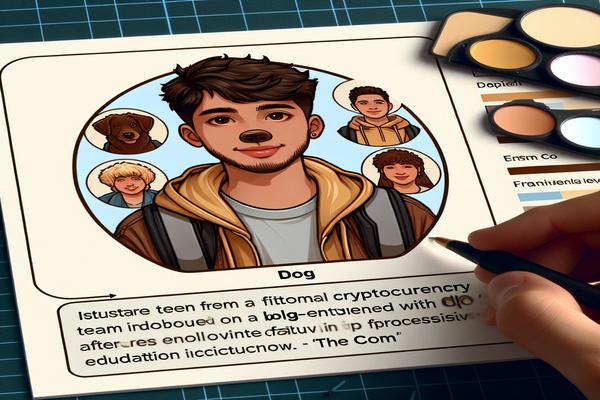The Controversy Surrounding Elon Musk’s DOGE Team: Youth, Cybersecurity, and Accountability
Recent revelations about a young employee associated with Elon Musk’s Department of Government Efficiency (DOGE) have sparked a significant conversation. It’s surrounding issues of cybersecurity, privacy, and the potential ramifications of placing young talent in high-stakes positions. The tale of Edward Coristine—an individual who has been labeled a “cybercriminal insider”—has raised eyebrows and concerns amongst the public and professionals alike. In this article, we’ll delve into the details surrounding this case, examine the implications of such actions, and consider the evolving landscape of cybersecurity, highlighting key players and potential future developments.
The Rise of Edward Coristine
As reported by KrebsOnSecurity and Wired, the 19-year-old Edward Coristine, also known in certain circles by his online moniker “Big Balls,” has gained notoriety for his role in Musk’s DOGE team. Despite his youth, Coristine’s association with various cybercrime networks cannot be overlooked. Before joining Musk’s venture, he was a notable figure within “The Com,” a decentralized web of Discord and Telegram channels that facilitate collaboration among cybercriminals. These platforms serve as ground zero for illicit activities such as hacking, fraud, and the trafficking of stolen data.
A staggering revelation emerged when reports indicated that Coristine accessed sensitive U.S. government databases, including crucial systems associated with the Treasury, the Office of Personnel Management, the Department of Education, and the Department of Health and Human Services. This access raises pressing questions about the hiring practices and security clearance protocols within organizations handling sensitive data. In Coristine’s case, his history might have been expected to bar him from receiving the necessary clearances for such roles.
The Technology Landscape and Cybersecurity Risks
The increasing trend of employing young tech talent within critical systems is juxtaposed with possible cybersecurity threats. Fresh perspectives are invaluable in the tech industry. The potential risk that accompanies hiring individuals who may lack comprehensive cybersecurity backgrounds is significant. According to a report from Cybersecurity Ventures, cybercrime is projected to cost the world $10.5 trillion annually by 2025, reflecting the growing sophistication of cyber threats and the need for robust security measures.
Historically, cybersecurity breaches often stem from insider threats, which can span from negligent behavior to malicious actions taken by disgruntled employees or individuals with questionable backgrounds. According to the 2021 Insider Threat Report by CyberEdge Group, 74% of organizations experienced at least one insider threat incident in the previous year. This statistic underscores the critical need for thorough vetting processes in an era where data security is of paramount importance.
A Deeper Dive into the DOGE Team’s Mission
Technically, Elon Musk’s DOGE team aims to enact reforms within government systems, leveraging technology to enhance efficiency and transparency. While the ambition behind DOGE may resonate with the call for modernizing tech in government, the manner in which these reforms are pursued warrants careful scrutiny.
In the wake of Coristine’s involvement, many experts argue that hiring protocols may require a reevaluation. Character backgrounds should be as important as technical capabilities, ensuring that those entrusted with sensitive information align with ethical standards expected in public service. The goal should be to cultivate a secure and trustworthy environment for handling citizens’ private data.
Key Players and Industry Developments
The cybersecurity landscape is rich with players dedicated to managing risks inherent in this rapidly evolving field. Prominent organizations include:
1. Microsoft: With its cloud services and comprehensive cybersecurity solutions, Microsoft remains at the forefront of protecting organizations from cyber threats.
2. Palo Alto Networks: This cybersecurity company specializes in advanced firewalls and cloud-based offerings designed to counteract increasingly sophisticated attacks.
3. CrowdStrike: Known for its endpoint security, threat intelligence, and cyberattack response capabilities, CrowdStrike has positioned itself as an invaluable partner for businesses in addressing cybersecurity challenges.
4. Cisco: Through its Networking and Security solutions, Cisco provides a holistic approach to securing networks against potential breaches.
5. FireEye: A recognized name in incident response, FireEye offers services aimed at identifying and mitigating threats before they can escalate into serious security events.
In terms of future advancements, organizations within this sector are currently investing in machine learning. And also artificial intelligence to enhance threat detection capabilities. According to Gartner, the global cybersecurity market is expected to reach $345.4 billion by 2026. Reflecting both the increasing investment in cybersecurity and the heightened need for innovative solutions.
The Ethical Implications of Youth Employment in the Tech Sector
This case involving Edward Coristine is a clarion call urging businesses and governmental agencies to reassess their commitment to ethical hiring practices. Can organizations continue to favor high-tech talent over experience and ethical considerations? The digital ecosystem is rife with temptations and opportunities for misuse. More tech-savvy young people enter the workforce, this question becomes even more pressing.
Ethics in technology is paramount, with particular importance placed on the need for organizations to create a culture of responsibility. Encouraging transparency, implementing robust security protocols, and promoting ethical behavior should be at the forefront of any organization’s strategy. Conversations about responsible digital citizenship should form part of educational curricula, equipping young tech enthusiasts with not just skills but also an appreciation of their broader impact on society.
Conclusion: A Call to Action
The revelations surrounding Edward Coristine exemplify the urgent need for a reassessment. This includes youth employment, technology, and cybersecurity. Every organization must be sure that hiring and training practices emphasize not just capability but also integrity.
To safeguard sensitive data and public trust, industry leaders and policymakers must work collaboratively . All to generate secure frameworks that prioritize ethical hiring practices and accountability. Enhanced training programs focusing on cybersecurity ethics, alongside rigorous hiring protocols, will be essential in navigating this complex landscape.
As we move forward, it’s imperative that we engage in discussions about the future of technology. The ethical implications of our hiring choices, and the potential risks involved. Stakeholders must collaborate towards building a secure digital future where talent and ethics go hand in hand.
Now is the time to act! Engage with your local technology firms, educational institutions, and government entities . Avocate for responsible hiring practices and a more secure digital future. Your voice matters in shaping this evolving landscape!



